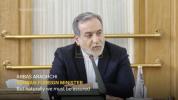איראַן איז גרייט צו אנהייבן נוקלעאַרע פארהאנדלונגען אויב אמעריקע גאַראַנטירט אז זיי גייען מער נישט אטאקירן


In a significant development that could reshape diplomatic relations in the Middle East, Iran’s Foreign Minister stated on Saturday that Tehran is open to resuming nuclear negotiations — but only if the United States provides guarantees against future military attacks.
Speaking at a press briefing in Tehran, Foreign Minister Hossein Amir-Abdollahian emphasized Iran's readiness to engage in "serious and constructive dialogue" regarding its nuclear program. However, he made it clear that any progress hinges on Washington offering formal assurances that it will not carry out or support attacks against Iranian territory or interests.
"We are not against diplomacy. We have always kept the door open," Amir-Abdollahian said. "But experience has shown us that without solid guarantees, talks will not lead to sustainable outcomes. The Islamic Republic cannot return to the table while under threat."
The remarks follow heightened tensions in recent months, including reports of sabotage against Iranian facilities and drone activity near key military sites. While the United States has not claimed responsibility for any such actions, Iranian officials have long accused Washington and its allies of covert operations aimed at destabilizing the regime.
The U.S. State Department has yet to issue an official response to Amir-Abdollahian’s comments. However, analysts suggest that the demand for security guarantees could complicate the already fragile efforts to revive the 2015 Joint Comprehensive Plan of Action (JCPOA), which has been in limbo since the U.S. withdrawal in 2018.
International observers view Iran’s latest stance as a calculated diplomatic maneuver, aimed at regaining leverage while projecting a defensive posture to its domestic audience. It also signals that Tehran may be seeking to reduce the risk of escalation in a volatile regional environment, especially amid shifting alliances and deepening tensions with Israel and Gulf states.
Whether the U.S. is willing to meet Iran’s conditions remains to be seen. But with both sides expressing conditional openness, the possibility of a renewed dialogue — albeit on more cautious terms — appears to be back on the global agenda.
גאלערי
ווידעאס